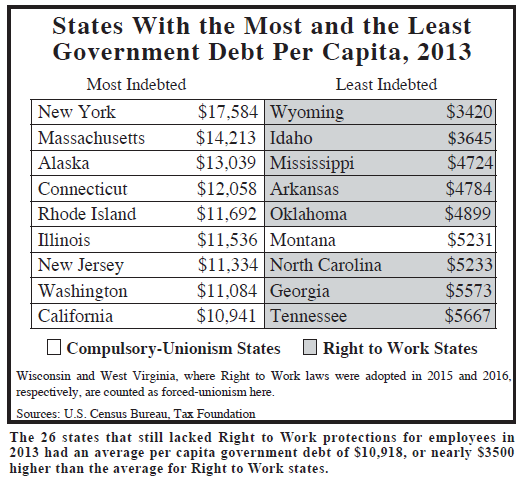Is This Any Way to Run a City’s Schools?
Leaked CTU Proposals Won’t Do Anything to Improve Schools’ Poor Performance
For years, government union monopolists have been ripping off ordinary taxpayers in Illinois, a state where both private- and public-sector employees may be forced to pay Big Labor dues or fees as a job condition, in a host of ways.
Meanwhile, the Prairie State’s economic performance has been abysmal.
From 2005 to 2015, for example, private-sector payroll employment in Illinois, as measured by the U.S. Labor Department, grew significantly less than half as much as the national average and less than 25% as much as the average for the 22 states that had Right to Work laws on the books for the whole period.
In November 2014, fed-up Illinoisans elected Republican Gov. Bruce Rauner, who promised to curtail government union kingpins’ special privileges in order to get public compensation under control.
With the state effectively broke, Mr. Rauner has insisted the insanity of Big Labor-negotiated contracts that force taxpayers, for example, to spend $15,000 a year per member of the American Federation of State, County and Municipal Employees (AFSCME) union on health-care costs alone must come to an end.
In response, AFSCME and other union bosses are fighting furiously to pass a measure forfeiting the Illinois governor’s negotiating powers to an unelected arbitrator whenever an “impasse” in contract talks is declared.
Aggregate Debt Burden For Forced-Dues States 25% Greater Than For Right to Work States
 National Right to Work Committee President Mark Mix commented that data from the U.S. Census Bureau and the nonpartisan, Washington, D.C.-based Tax Foundation lend support to Bruce Rauner’s view that monopolistic unionism is a key source of his state’s chronic fiscal woes:
National Right to Work Committee President Mark Mix commented that data from the U.S. Census Bureau and the nonpartisan, Washington, D.C.-based Tax Foundation lend support to Bruce Rauner’s view that monopolistic unionism is a key source of his state’s chronic fiscal woes:
“As of 2013, the most recent year for which data are available, New York, Massachusetts, Alaska, Connecticut, Rhode Island, Illinois, New Jersey, Washington, California, Pennsylvania, Hawaii and Colorado were the 12 states with the greatest state and local per capita debt in absolute terms.
“Not one of these states protects the individual employee’s Right to Work.
“Meanwhile, among the nine states with the least absolute debt per capita, eight — Wyoming, Idaho, Mississippi, Arkansas, Oklahoma, North Carolina, Georgia and Tennessee — have Right to Work laws prohibiting the termination of employees for refusal to join or pay dues or fees to an unwanted union. Forced-unionism Montana is the sole exception.
“In 2013, forced-unionism states collectively had a state-and-local government debt equivalent to 22.9% of their combined 2013 personal income as reported by the U.S. Commerce Department.
“That’s a debt burden 25% greater than Right to Work states’.”
‘Control of Public Employees’ Carries With It the Power to Bring the Public ‘to Its Knees’
As the chief executive of a state in which Big Labor has a lock grip on both chambers of the Legislature, Bruce Rauner is very unlikely in the foreseeable future to get a chance to sign any statute rolling back union bosses’ monopoly privileges.
Indeed, as this Newsletter edition goes to press Mr. Rauner remains embroiled in a battle to prevent taxpayers from losing the little power they currently wield, through their elected officials, over how public employees are compensated.
“In 2015 and again this spring,” recalled Mr. Mix, “union-label legislators sent to the governor’s desk a measure that would have required him to surrender his authority to negotiate with government union bosses to an unaccountable arbitrator whenever labor bureaucrats decided there was a bargaining ‘impasse.’
“Fortunately, last year and again this year, Big Labor fell just a couple of votes short of overriding Mr. Rauner’s veto and adopting a statue that would have significantly curtailed Illinoisans’ ability to govern themselves.
“In a prophetic 1974 article for the Wake Forest Law Review, law professor Sylvester Petro, who has since passed away, warned about the threat to republicanism posed by monopolistic government unionism. Dr. Petro’s words now ring truer than ever:
“‘[T]he control of public employees … carries with it the power to bring’ politicians ‘to heel and the general public … to its knees.’”

Leaked CTU Proposals Won’t Do Anything to Improve Schools’ Poor Performance

Wherever Big Labor wields the power to collect forced union dues, union bosses funnel a large share of the confiscated money into efforts to elect and reelect business-bashing politicians. Employment growth tends to lag as a consequence.

Members Insist They Keep Pro-Right to Work Campaign Promises